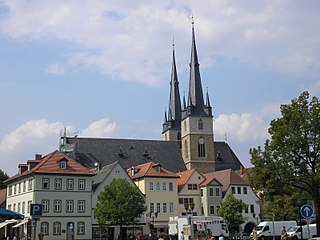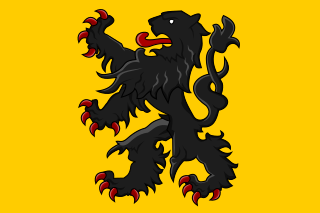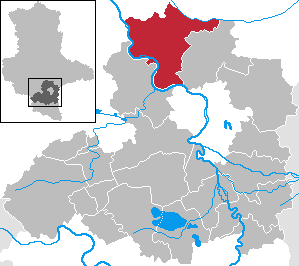
Wettin is a small town belonging to the municipality of Wettin-Löbejün in the Saale District of Saxony-Anhalt (Saxony-Ascania), Germany. It is situated on the River Saale, just north of Halle. It is known for Wettin Castle, the ancestral seat of the House of Wettin, the former ruling dynasty of Saxony, Poland, the United Kingdom, Belgium, and Bulgaria. The town and its name are of Slavic origin.

The House of Wettin is a dynasty of German counts, dukes, prince-electors and kings that once ruled territories in the present-day German states of Saxony, Saxony-Anhalt and Thuringia. The dynasty is one of the oldest in Europe, and its origins can be traced back to the town of Wettin, Saxony-Anhalt. The Wettins gradually rose to power within the Holy Roman Empire. Members of the family became the rulers of several medieval states, starting with the Saxon Eastern March in 1030. Other states they gained were Meissen in 1089, Thuringia in 1263, and Saxony in 1423. These areas cover large parts of Central Germany as a cultural area of Germany.

Saalfeld is a town in Germany, capital of the Saalfeld-Rudolstadt district of Thuringia. It is best known internationally as the ancestral seat of the Saxe-Coburg and Gotha branch of the Saxon House of Wettin, which was renamed the House of Windsor during their British reign in 1917.

Frederick I, the Belligerent or the Warlike, a member of the House of Wettin, ruled as Margrave of Meissen from 1407 and Elector of Saxony from 1423 until his death.

The Margravate of Meissen was a medieval principality in the area of the modern German state of Saxony. It originally was a frontier march of the Holy Roman Empire, created out of the vast Marca Geronis in 965. Under the rule of the Wettin dynasty, the margravate finally merged with the former Duchy of Saxe-Wittenberg into the Saxon Electorate by 1423.

The Battle of Lucka occurred on 31 May 1307 near the village of Lucka. The settlement was first mentioned in 1320, but had already existed for around 700 years before that. Lucka is located in the Altenburger Land district of Thuringia.

Löbejün (help·info) is a former town in the Saalekreis in Saxony-Anhalt, Germany. Since 1 January 2011, it is part of the town Wettin-Löbejün.
Saalkreis Nord was a Verwaltungsgemeinschaft in the Saalekreis district, in Saxony-Anhalt, Germany. It was situated northwest of Halle (Saale). The seat of the Verwaltungsgemeinschaft was in Wettin. It was disbanded in January 2011.

The Treaty of Leipzig or Partition of Leipzig was signed on 11 November 1485 between Elector Ernest of Saxony and his younger brother Albert III, the sons of Elector Frederick II of Saxony from the House of Wettin. The agreement perpetuated the division of the Wettin lands into a Saxon and a Thuringian part, which in the long run obstructed the further development of a Central German hegemonic power in favour of Brandenburg-Prussia.

Nauendorf is a village and a former municipality in the Saalekreis district, Saxony-Anhalt, Germany. Since 1 January 2011, it is part of the town Wettin-Löbejün.

Rothenburg is a village and a former municipality in the Saalekreis district, Saxony-Anhalt, Germany. Since 1 January 2011, it is part of the town Wettin-Löbejün. The Rothenburg Ferry, a cable ferry, crosses the Saale river at Rothenburg.

Brachwitz is a village and a former municipality in the Saalekreis district, Saxony-Anhalt, Germany. Since 1 January 2011, it is part of the town Wettin-Löbejün.

Domnitz is a village and a former municipality in the Saalekreis district, Saxony-Anhalt, Germany. Since 1 January 2011, it is part of the town Wettin-Löbejün.

Gimritz is a village and a former municipality in the Saalekreis district, Saxony-Anhalt, Germany. Since 1 January 2011, it is part of the town Wettin-Löbejün.

Plötz is a village and a former municipality in the Saalekreis district, Saxony-Anhalt, Germany. Since 1 January 2011, it is part of the town Wettin-Löbejün.
Kranichfeld is a Verwaltungsgemeinschaft in the district Weimarer Land in Thuringia, Germany. The seat of the Verwaltungsgemeinschaft is in Kranichfeld.

Alūksne Municipality is a municipality in Vidzeme, Latvia. It is located in the northeast of the country and borders Ape in the west, Balvi Municipality, Gulbene Municipality and Alūksne Municipality in the south, Pskov Oblast of Russia in the east and Võru County of Estonia in the north. The administrative center of the municipality is Alūksne.

Wettin-Löbejün is a town in the district Saalekreis, in Saxony-Anhalt, Germany. It was formed on 1 January 2011 by the almagamation of the former municipalities Löbejün, Wettin, Brachwitz, Döblitz, Domnitz, Gimritz, Nauendorf, Neutz-Lettewitz, Plötz and Rothenburg.

Stefan Altner is a German musician, musicologist and manager.











